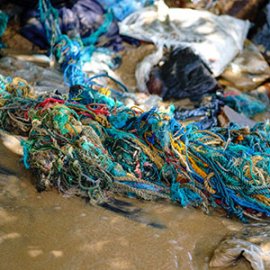A Plan for Plastic, part one
-
English
-
ListenPause
[intro music] Welcome to World Ocean Radio… I’m Peter Neill, Director of the World Ocean Observatory. How many editions of World Ocean Radio have addressed the critical problem of plastic in the ocean? Despite constant coverage by the press, with images of plastic debris piled on beaches, flowing in rivers, swallowed by birds and fish, floating in massive cumulations in the open sea, ground into micro-beads by waves and friction into an invisible threat, up into the atmosphere to circulate as rain, down into the food chain, into marine species, and ultimately into our bodies – the plastic problem persists as a physical, or financial, or cultural force that seems immune to reason, effective action, and solution. I am asked all the time: what can we do about plastic? The plastic challenge has been met mostly episodically – an engineering solution, a campaign to clean up beaches, a start-up for recycled plastic containers – many such independent initiatives that fail, sometimes because they are bad ideas, but primarily because they are part of no overall, coherent plan. In the meantime, a recent report by the Pew Foundation suggests that the flow of plastic into the ocean will increase by almost 300%, from 11 million metric tons in 2016 to 29 million metric tons in 2040, not an indicator of a successful strategy in place to solve the problem. The Pew report was prepared in partnership with SYSTEMIQ, self-described as a “system change company,” a collaborative designer, that helps to create plans to transform how we live and work in five areas of economic endeavor, of how we live and work: energy, nature and food, materials, urban areas and finance. “Our work,” its website declares, “is a unique combination of coalition building, specialist advisory services, leadership transformation, policy development, redesign of markets and value chains, capital mobilization, on-the-ground action, as well as incubation of and investment in early-stage businesses.” Jargon aside, these intentions do define the essential challenge to transformational action for the ocean, and for the land too certainly, the need for an informed and integrated strategy that will direct governments, non-profits, municipalities, investors, and environmentalists to agree on and coalesce behind a set of findings coupled to a set of actions that confront the conventional values, structures, and behaviors that have created, and perpetuate, the problem. Beyond documentation of unabated plastic production, discard, and inadequate response, the findings include: that current commitments by major industries and governments are not even close to the established goals; that there is no single solution to the plastic challenges, upstream and downstream response needing to be deployed together; that change will require substantial shift of investment away from production and conversion of virgin plastic to new delivery models, substitutes, recycling facilities, and collection infrastructure; that high income countries, as the major producers, should take the lead in reduction; and that every delay simply exacerbates the problem. What these findings conclude is, that despite assertion and intent, there is an underlying resistance to change that inhibits innovation and undermines progress. The explanation for this would seem to be the unwillingness of the plastic industry, a product based on oil, either to limit production, to invent and finance alternatives, or to redirect its profit motive toward redress, new forms of packaging, and other innovation without similar environmental and social consequence. Governments seem disinterested, regulation limited, and the power pf public opinion discounted with certain exceptions, the plastic bag foremost among them. Where I live, in a matter of months, the banning of plastic bags at supermarkets and other locations was enacted, motivated primarily by local activists who persevered, from the bottom up, through local ordinances and political will, demanded change and were successful almost overnight. It was an astonishing demonstration of public interest, and the plastic bag production and use around here was reduced to zero. But one instance of success is not a plan. The Pew/SYSTEMIQ Report augmented its finding with recommendations, an outline of steps with examples that represents a coherent and provocative way forward…issues that we will discuss in future editions of World Ocean Radio. [outro music]
A new analysis by The Pew Charitable Trusts, in association with SYSTEMIQ, finds that without immediate and sustained action, the annual flow of plastic into the world ocean could nearly triple by 2040. The study also identifies solutions that could cut this volume by more than 80% if we use technologies available today and if key decision-makers are willing to make the changes required. This week and next on World Ocean Radio we are laying out steps with examples that represent a coherent and provocative way forward toward a plastic-free future. Part one of a two-part series.
About World Ocean Radio
5-minute weekly insights dive into ocean science, advocacy and education hosted by Peter Neill, lifelong ocean advocate and maritime expert. Episodes offer perspectives on global ocean issues and viable solutions, and celebrate exemplary projects. Available for syndicated use at no cost by college and community radio stations worldwide.
Image
Sören Funk / Ocean Image Bank
The Ocean Image Bank is a free resource developed by The Ocean Agency to support ocean science and conservation communication and is an official part of the UN Ocean Decade. It has been made possible due to the generous support of people like you.
FMI: theoceanagency.org
Episode Resources
Visit: pewtrusts.org
- Login to post comments



